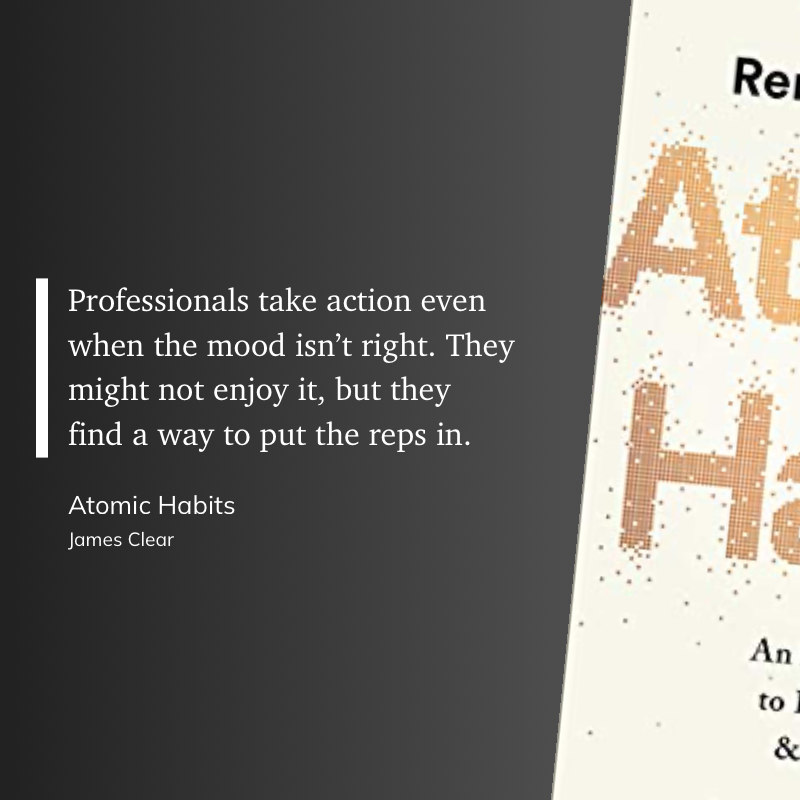Building Resiliency Muscles: Essential Strategies for Teachers to Thrive in Challenging Times
Teaching is a profession filled with challenges and tough moments. It has its ebbs and flows like the tides of the ocean. In these times, true professionals show their strength - the ability to keep going and stay consistent, even when motivation is low.

As an Amazon Associate, I earn from qualifying purchases. All affiliate links are marked with an asterisk (*). This helps support the newsletter. Thank You! Read more here.
PUTTING IN THE REPS
In today’s Readwise feed, the following quote by James Clear popped up:
"Professionals take action even when the mood isn't right. They might not enjoy it, but they find a way to put the reps in."
This idea is particularly relevant for teachers.
Like all teachers, I’ve had bad days, weeks, months, and even a year or two (currently in my 26th year).
Teaching is a profession filled with challenges and tough moments. It has its ebbs and flows like the tides of the ocean. In these times, true professionals show their strength - the ability to keep going and stay consistent, even when motivation is low.
Clear's quote is all about building resilience. For teachers, this means developing the mental and emotional strength to get through hard days, handle difficult students, or manage heavy workloads. It's about showing up and doing our best, even when we don't feel like it.
But resilience isn't just about pushing through. It's about finding strategies that help us stay effective and passionate, even when things get tough. This might mean seeking support from colleagues, practicing self-care, or continuously improving our teaching methods to stay engaged.
Over time, the ability to "put in the reps" becomes a key trait of great educators. It sets apart those who just do the job from those who excel and make a lasting impact. By consistently showing up and giving our best, we improve our skills and set a powerful example for our students.
Becoming an outstanding teacher, leader, or professional in any field means learning to work through challenges, even when it's hard. It's about building momentum, one day at a time, one lesson at a time. Embracing this mindset not only boosts our professional growth but also enhances our students' quality of education.
P.S. - All this being said, teaching isn't sustainable without the ability to give yourself grace. In many ways, teachers are set up to fail. There is more on our plate than we can ever get done. All we can do is “put the reps in” and let the rest go.

How to Build Your Resiliency
- Practice mindfulness and meditation to manage stress and stay present: Research shows that mindfulness and meditation can reduce stress, improve focus, and enhance emotional regulation, helping teachers stay calm and effective in challenging situations.
- Develop a strong support network with colleagues, friends, and family: A reliable support system provides emotional and practical assistance, fostering a sense of belonging and reducing feelings of isolation. The bottom line is to guard and feed relationships with colleagues who support you. They are more valuable than gold.
- Set realistic goals and prioritize tasks to prevent feeling overwhelmed: Breaking down tasks into manageable steps can increase productivity and reduce anxiety, allowing teachers to focus on what's most important without feeling overloaded. Pick the most important things to get done. Lists that are too long can cause stress.
- Engage in regular physical exercise to boost mood and energy levels: Physical activity releases endorphins, improving mood and energy, making it easier to handle the physical and emotional demands of teaching.
- Keep a reflective journal to process experiences and emotions: Journaling helps teachers reflect on their experiences, identify patterns, and express emotions, which can lead to greater self-awareness and emotional resilience.
- Participate in professional development to stay motivated and inspired: Continuous learning and skill development can reignite passion for teaching, provide new strategies for the classroom, and reduce burnout.
- Establish boundaries to maintain a healthy work-life balance: Setting clear boundaries between work and personal life helps prevent burnout, ensuring teachers have time to recharge and pursue personal interests.
- Incorporate regular breaks and downtime into your schedule: Taking breaks throughout the day and scheduling downtime can prevent fatigue, improve concentration, and enhance overall well-being.
- Seek feedback and mentorship to continuously improve and stay engaged: Constructive feedback and mentorship provide guidance, support professional growth, and help teachers stay connected and motivated. If you are lucky enough to have an effective instructional coach, seek out their services.
- Cultivate a positive mindset by focusing on successes and growth opportunities: Focusing on achievements and viewing challenges as opportunities for growth can build resilience and foster a more optimistic outlook on teaching.
Recommended Reading
- Atomic Habits Book - Book notes and takeaways
- The Obstacle is the Way - Book notes and takeaways
- The Bullet Journal Method - Book notes and takeaways
- Onward: Cultivating Emotional Resilience in Educators (*affiliate link)—I’m about two-thirds of the way through this book. It has some solid recommendations for teachers, but what I really like is that it has recommendations for principals and administrators that will help improve the resilience of their staff.
- Positive Mindset Habits for Teachers: 10 Steps to Reduce Stress, Increase Student Engagement and Reignite Your Passion for Teaching (*affiliate link)



